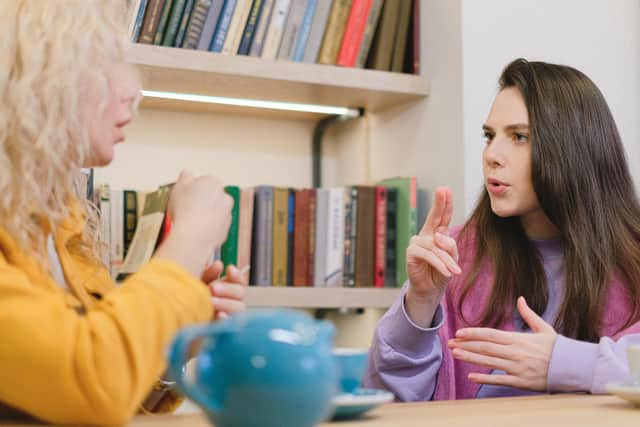Deaf awareness training delivered to GP practice staff across Bedfordshire, Luton and Milton Keynes
and live on Freeview channel 276
Staff in GP practices across Bedfordshire, Luton and Milton Keynes have completed Deaf Awareness Training to help improve access to healthcare for the D/deaf community.
D/deaf is a commonly used term to capture both people who are born Deaf and those who become deaf after they are born.
Advertisement
Hide AdAdvertisement
Hide AdThe training for non-clinical staff, provided examples of barriers and discrimination that D/deaf and Hard of Hearing people face. It also provided an introduction to some everyday BSL (British Sign Language) signs, fingerspelling, and numbers.


The training was provided by Access Bedford – a registered charity that works with the D/deaf and hard of hearing community to make Bedford Borough more accessible – in partnership with Bedfordshire, Luton and Milton Keynes Integrated Care Board.
Alexia Stenning, Associate Director Primary Care Commissioning and Transformation, at Bedfordshire, Luton and Milton Keynes Integrated Care Board, said: “D/deaf people in our local communities have told us that simply being D/deaf is a barrier to accessing healthcare.
“It is incredibly important that we engage with communities such as the D/deaf community to be able to understand the challenges they face and how we can improve their experience of accessing healthcare. Rolling out this training is a great example of doing just that.”
Advertisement
Hide AdAdvertisement
Hide AdThe training ensures that practices understand the Accessibility Information Standard, which sets out a specific, consistent approach to identifying, recording, flagging, sharing and meeting the information and communication support needs of patients, service users, carers and parents with a disability, impairment or sensory loss. This includes ensuring that practice staff are aware of how to book a British Sign Language (BSL) interpreter for any patients who are deaf.
Helene Bolton, Trustee at Access Bedford, said: “We are contacted by D/Deaf and Hard of Hearing people on a regular basis, looking for support to overcome issues they face when trying to access healthcare. It is vital that healthcare staff can recognise potential barriers to access and communicate with D/Deaf and Hard of Hearing people to ensure they are receiving the level of care that they deserve.
“We believe that through informing and raising awareness of these issues, we can support service providers to improve their offering to D/Deaf and Hard of Hearing people.”